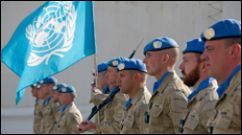Today’s Top Stories
1. Despite US and Israeli opposition, the UN Human Rights Council is pushing forward with a blacklist of international companies that do business in Israeli settlements. The Washington Post writes:
American companies on the list drawn up by the Geneva-based council include Caterpillar, TripAdvisor, Priceline.com, Airbnb and others, according to people familiar with it. It is not clear whether the list has been finalized.
Zeid Ra’ad Al Hussein, the U.N. high commissioner for human rights, has told U.S. officials he plans to publish the list by the end of the year and has asked for comments by Sept. 1 from countries where affected firms are headquartered, diplomats said.
2. For the first time, Hezbollah confirmed it used drones to bomb Islamic State positions near the Syrian-Lebanese border. Here’s the footage Hezbollah released. More at Reuters.
https://youtu.be/VG-j3lxHn1c
3. According to a confidential UN report seen by Reuters, “two North Korean shipments to a Syrian government agency responsible for the country’s chemical weapons program were intercepted in the past six months.”
4. ‘Resistance Journalism’ Doesn’t Deserve Press Credentials: Al Jazeera Jerusalem bureau chief says it’s legitimate for a reporter to “resist Israel” through his work because it’s non-violent.
Join the fight for Israel’s fair coverage in the news
Israel and the Palestinians
• Switzerland stopped funds to a Palestinian non-governmental organization which failed to sever ties with terror groups. The Jerusalem Post picked up on a Swiss report.
• Haaretz: Egypt’s becoming an unexpected player in Syria, to Israeli delight and Iranian ire.
• PA threatens to cut all funds to Gaza.

“There is no problem normalizing relations with Israel; the Palestinians normalized relations with Israel even Hamas is talking to Israel. The Palestinians receive tax money from Israel and electricity from Israel. The Palestinians sit with Israel and talk to Israel. They have disputes but they sit with them,” he said . . .
Fadil told the interviewer that the Palestinians bear a significant measure of responsibility for what happened to them.
Around the World
• 57 years after Israel spirited Nazi fugitive Adolf Eichmann out of Argentina on an El Al flight, the two countries announced the resumption of Tel Aviv-Buenos Aires flights on their respective national airlines.
• Europe adopts Israel-style security measures as terror becomes the new normal.
Indeed, commentaries by Richard Kemp, David Patrikarakos and Ariel Bolstein elaborate, while the INSS (Institute for National Security Studies) examines what Europe’s security challenges mean for the Israeli arms industry.

• Australia’s ABC News explained to the JTA why it left Israel off the map:
“The story was about the repealing of a law in Lebanon that allowed rapists to escape punishment if they married their victims,” a senior executive for the Australian Broadcasting Corp. told JTA. “The map showed other countries where this law had already been repealed (in the blue) and countries where campaigners are actively trying to have it repealed (in the yellow).”
Israel, the executive explained, never had the law to begin with, so it was not included. Had it been included, the spokesman suggested, the criticism might have been even more intense.
• Vandals scrawl anti-Israel graffiti on Bulgarian Jewish monument
Commentary/Analysis

Over the past year alone, we have shared with the Security Council new information detailing how border towns have become Hezbollah strongholds. One out of three buildings in the village of Shaqra is now being used to store arms or launch attacks on Israel. We also shared with the council intelligence revealing how the Iranians use civilian airlines to smuggle dangerous arms into southern Lebanon. When the Second Lebanon War ended, Hezbollah had around 7,000 rockets. Today, they have more than 100,000.
• Ahead of tomorrow’s meeting between Israeli Prime Minister Benjamin Netanyahu and Russian President Vladimir Putin in Sochi, Prof. Eyal Zisser and Jerusalem Post assess what’s in store.
• Here’s what else I’m reading today . . .
– Zoe Strimpel: Anti-Semitism 2.0: Why everything always comes back to the Jews
– Khaled Abu Toameh: Palestinians: When suicide attacks are bad
– Brig.-Gen. (res.) Yossi Kuperwasser: The Temple Mount affair: What has changed?
– Maj. Gen. (ret.) Yaakov Amidror: Beware media fearmongering
– Amb. Arye Mekel: The new US “peace team”: A test of will
– Col. (ret.) Dr. Jacques Neriah: The future partition of Syria
– Moshe Arens: North Korea and Iran: Two different approaches for two dangerous nuclear projects
Featured image: CC BY jimnista; Mahdi via YouTube/Sudania24; police CC BY Robert Anders; UNIFIL via UNIFIL;
For more, see yesterday’s Israel Daily News Stream and join the IDNS on Facebook.
Before you comment on this article, please remind yourself of our Comments Policy. Any comments deemed to be in breach of the policy will be removed at the editor’s discretion.

